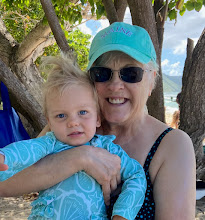I’ve forgotten how hard it is to write through the vast,
uncharted wilderness of the middle of a novel. Beginnings are fairly easy, once
you get started. There’s the anticipation of discovery, the excitement of creating, those
emotions alone will get you well through the beginning. I’ve read a lot of
incomplete, and often unpublished,
manuscripts with killer beginnings. They’re polished, compelling,
full of promise, but the writer never gets past the opening few chapters.
Endings are the next easiest. The threads of the story start to twine together.
You know right where you’re going, or if you write like I do, you know the ending
when you get there. It just feels right, that last sentence or scene, the
closing of the action, the change in the characters. And what a terrific
feeling it is to write THE END.
Fait accompli. Task completed. Hooray!
But oh, the damned middle….
Is the pacing too slow? Too fast? Do you really need that
second love scene, that bit of period detail, the elaborate description of that sunset? Are you repeating yourself? Has this or that character flaw already
been well-established? Is this thing really necessary, or that thing moving the
plot along? You begin to question everything. Doubt takes hold. And
what is the point of this stupid story anyway?
It’s easy to give up at the middle. I’ll bet there have been
many fine novels abandoned in the middle. I have a few in my file cabinet,
where in the middle I began to feel as if I had been wasting paper and ink on
an incohesive, implausible story idea. And just stopped. Sometimes forever.
So do you soldier on? Or is there another way to grab this
bull and throw it? Am I mixing metaphors? Sliding into cliché? Have I suddenly
realized with purity that I just can’t write? At all. Every sentence begins
with “he” or “she” or the dialogue goes on for eternity. What the hell is the
purpose of this chapter anyway? Maybe I should just cut out the whole dreadful thing.
My first novel – (before I go on I want to qualify that
phrase. It wasn’t my “first” first novel, it was just the first one that got
published. The others are moldering in my attic.) – which
ended up with the title of LILY, came to me after spending an entire day
reading microfilm at the Bastrop library. I was interested in finding out what
had happened at a grand jury hearing back in 1883.
I had a scalding headache by the time I drove myself back home. But that night
I wrote the first chapter. The next day, I got up and wrote the pivotal scene
in the center of the book, the one that the story would turn on, and I wrote
from there to the end. Then when I had that much, I went back to the end of
that first chapter, and wrote from the second chapter to the pivotal scene. I
didn’t know what the chapter number would be for that pivotal scene when I
wrote it, nor did I know this for the subsequent chapters that propelled the
story to the end. There was much to discover in writing the story backwards. I
didn’t know any better. It had not come to me yet that this was no way to write
a novel. The other three novels were written from Chapter 1 to the end, in
linear fashion. But maybe, just maybe, I was onto something with LILY.
Some writers plot and outline, or write synopses of varying
lengths, then flesh out the bones from there. I can definitely see the benefit
of this, particularly with mysteries or thrillers. But for me, and for the kind
of novels I like to write, this would spoil the fun of writing the thing.
Wait a minute! Did I just say “fun?” This is supposed to be
FUN! Wow! Somewhere along the line I think I have forgotten about fun. Creating
a story that will be fun for someone to read, should be fun to write. Shouldn’t
it? I’ve heard the phrase “open a vein and bleed.” I don’t remember who said it
but it was some famous writer. However, I don’t write that sort of book. Mine
are not painful to write or read. I don’t want to write that sort of book and I
don’t want to read that sort of book either. When I started this writing quest
thirty-five years ago, I vowed to write the sort of book that I would want to
read myself. But of course, what I didn’t count on was how self-critical I
would become along the way.
Which gets me back to the damned middle. In workshops I’ve
taught, I have always told my students to give themselves permission to write a
poor first draft. Because the “real” writing is in the re-writing. And I know
that this is a true statement. So why is it that I have such a hard time taking
my own advice? Maybe the answer lies in the middle.
Onward….
